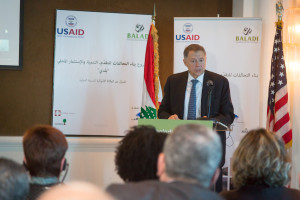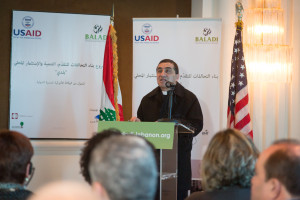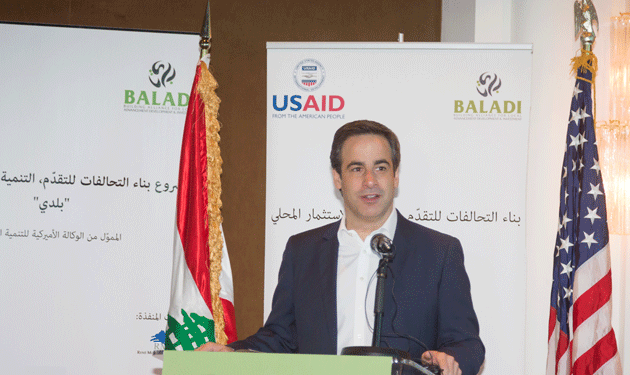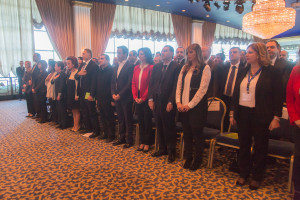Rene Moawad Foundation President Michel Moawad urged Thursday the implementation of administrative decentralization in Lebanon in a bid to fight rampant corruption within state institutions and promote sustainable development.
“It is impossible to promote sustainable development without implementing administrative decentralization as stipulated in the Constitution,” Moawad said during a ceremony held at Le Royal hotel in Dbayeh.
At the ceremony, Moawad unveiled a number of new municipal projects launched as part of the BALADI program, a five-year initiative undertaken by the Rene Moawad Foundation and funded by the the United States Agency for International Development (USAID) in Lebanon. The ceremony featured the launch of the second phase of the Baladi program, which resulted in the selection of 42 new development projects
In 2013, the BALADI program held its first call for municipal applications, which resulted in the implementation of 17 projects in collaboration with 36 municipalities and 43 local organizations.
Moawad urged the government to grant municipalities more powers to enable them to implement similar development projects.
“The solution is to grant municipalities and local authorities more powers as to enable them to promote sustainable development while the centralized government maintains a supervisory role,” Moawad said. “Otherwise, Lebanon will fail to fight corruption and public fund embezzlement will continue,” he warned.
Moawad argued that municipalities have succeeded where the government has failed. “The government needs to further empower municipalities by revising laws and investing in human development,” he said.
“How much would it cost us to train and empower 1,050 municipalities across Lebanon?” Moawad asked, arguing that billions of dollars are being squandered as demonstrated by the ongoing trash crisis, power rationing and the country’s ailing infrastructure.
Moawad stressed that the Rene Moawad Foundation’s mission transcends geographic, political and sectarian boundaries and focuses on ensuring a better future for the Lebanese regardless of their affiliations.
“These projects prove that the model of cooperation between local authorities, civil society groups and international donor organizations is a successful one,” Moawad argued, urging the implementation of administrative decentralization to bolster transparency and enable local authorities both financially and legally to undertake development projects.
The ceremony was attended by U.S. Chargé d’Affaires Richard Jones, USAID Mission Director Caroline Bryan , former Minister Nayla Mouawad, and head of Caritas Lebanon Father Paul Karam, along with mayors and representatives of municipalities from across Lebanon .

Ambassador Jones praised the collaboration of municipalities and highlighted that “activities being launched today will expand America’s support to local communities and represent a deepening of our commitment to Lebanon’s stability and prosperity.”

For his part, Father Karam said that Caritas will pursue its humanitarian mission despite all challenges.
Over the past five years, USAID has invested $166 million in targeted economic growth projects in water and sanitation, reforestation, agriculture, microfinance, support to small- and medium- enterprises, and good governance.
The five-year, $25.9 million BALADI project will continue through 2017.








 العربية
العربية